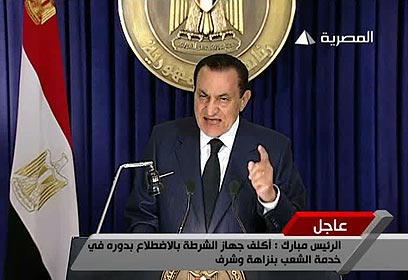
Egypt's army said on Wednesday that Egyptians had delivered their message, their demands had been heard and it was time for them to help Egypt return to normal life, a military spokesman said on state television.
It was a clear call for protesters to leave the streets.
"The army forces are calling on you ... You began by going out to express your demands and you are the ones capable of restoring normal life," a spokesman said, adding that the message and demands had been heard.
The army has previously issued statements saying it would not use violence against protesters and saying it understood the "legitimate demands" of the people.
The army's message to the demonstrators Wednesday had a conciliatory tone, appealing to young protesters to stand down "out of love for Egypt."
"You have started coming out to express your demands and you are the ones capable of returning normal life to Egypt," military spokesman Ismail Etman said in an address on state television. "Your message has arrived, your demands have become known."
Immediately after his statement, state television ran a scrolling message reading: "The armed forces call on the protesters to go home for the sake of bringing back stability."

Mubarak says won't seek another term (Photo: Reuters)
President Hosni Mubarak's embattled regime and the powerful military appeared to be making a unified push to end a street movement to drive out the 82-year-old leader.
The declaration was a clear shift in the stand of the army, which gave a tacit endorsement to the movement on Monday by saying it would not use force against protesters, and that they had legitimate demands.
Pro-Mubarak rally
Despite the army's appeal, hundreds of people gathered at the Mustafa Muhammad Square in Cairo to express their support for Mubarak, after more than a week of demonstrations demanding that he step down immediately after nearly 30 years in power.
Internet service also began returning to Egypt after days of an unprecedented cutoff by the government, and state TV said authorities were easing a nighttime curfew, which now runs from 5 pm to 7 am instead of 3 pm to 8 am.
The movement against Mubarak is fueled by deep frustration with an autocratic regime blamed for ignoring the needs of the poor and allowing corruption and official abuse to run rampant.
After years of tight state control, protesters emboldened by unrest in Tunisia took to the streets on January 25 and mounted a once-unimaginable series of protests across this nation of 80 million.
The emboldened protesters brought more than 250,000 people into Cairo's main square Tuesday to demand Mubarak leave within days. The president responded with a defiant statement pledging to finish out his term and serve seven more months in office.
Mubarak address to the nation around 11 pm Tuesday said he would serve out the last months of his term and "die on Egyptian soil." He promised not to seek re-election, but that did not calm public fury as clashes erupted in at least one city between his opponents and supporters.
Roee Nahmias, The Associated Press and Reuters contributed to this report
- Follow Ynetnews on Facebook















